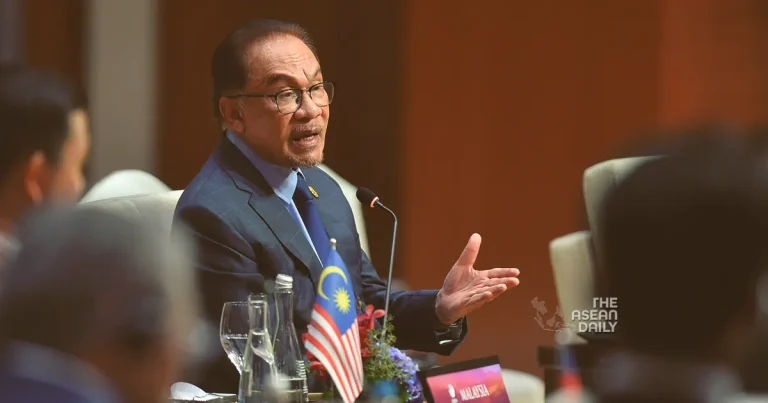29-9-2023 (KUALA LUMPUR) Speculation is intensifying in Malaysia that Prime Minister Anwar Ibrahim will soon undertake a major reshuffle of his Cabinet. When asked about it on Wednesday, Anwar said he was still “thinking about it,” but the reality is that he has little choice in the matter.
Anwar is facing mounting pressure on two key fronts that demand urgent action. Firstly, the recent “green wave” victories by opposition parties in the six state elections last month clearly demonstrate that support for Anwar’s unity government coalition among Malay voters has declined sharply since the general election last November.
Secondly, Anwar’s current Cabinet has failed to deliver on the basic expectations of the Malaysian people when it comes to easing the cost of living. Prices for everyday goods and services remain painfully high despite repeated promises of relief. Many citizens believe this mission to be impossible given the weakening ringgit, one of the worst performing currencies so far this year.
The ringgit was trading at 4.70 against the US dollar earlier this week, dangerously close to the psychological barrier of 5 ringgit to 1 US dollar. Fears are mounting that if nothing is done soon, it will breach this level by the end of 2022.
The impending annual budget expected in mid-October also makes this the only window for Anwar to reshuffle his Cabinet and signal a major shift in direction. Appointing fresh faces to helm the country’s finances would strongly convey that Anwar comprehends the need for new ideas and leadership on the economic front.
Another factor necessitating change is the crucial vacancy in the Domestic Trade and Cost of Living portfolio following the sudden death of minister Salahuddin Ayub after brain surgery in July.
The Balancing Act Facing Anwar
While the case for a reshuffle is clear, Anwar’s options are limited in several aspects.
Firstly, he must decide between a minor reshuffle involving just a few key portfolios, or a major overhaul extending beyond the Cabinet to the top tiers of the civil service, government-linked companies and statutory bodies.
Secondly, and most crucially, Anwar will have to perform a delicate balancing act when selecting new ministers. After waiting decades to assume the prime minister post, Anwar was finally sworn in last November 24th. But his unity government coalition was fragile, comprising members of the former Barisan Nasional regime, as well as parties from East Malaysia.
Ensuring adequate representation in Cabinet is thus essential for political stability. There is already discontent among Chinese parties that their Democratic Action Party, despite having the most parliamentary seats on the government bench, is under-represented. Conversely, UMNO and East Malaysian parties are seen as over-represented.
Anwar must also consider the seniority and special skills of those he appoints. More problematically, he will have to delineate responsibilities in overlapping portfolios to prevent perceptions of conflict. For instance, the business community is frustrated with redundant red tape from Rafizi Ramli’s Economy Ministry and Tengku Zafrul’s Trade and Industry Ministry operating in the same space.
Many feel it would be better for the Economy Ministry, only set up in 2018, to be dissolved with its core functions returned to the Finance Ministry.
Should Anwar Relinquish the Finance Portfolio?
In Kuala Lumpur’s political circles, it is widely agreed that the Finance, Health and Education ministries need the biggest shake-up.
Anwar currently holds both the Prime Minister and Finance Minister roles, despite earlier promising not to let one person control both positions. The finance ministry is pivotal, impacting every other ministry. Most say Anwar should appoint a full Finance Minister and relinquish the portfolio entirely.
The Health and Education ministers are also seen as having lost their way without instituting any substantive reforms over the past 10 months.
In education, a controversy erupted over introducing Islamic teachings in national schools, sparking accusations that the curriculum already has excessive religious content.
In health, the minister’s move to declassify vaping products as “poison” provoked a lawsuit from civil groups for enabling open sales of such items, including to minors.
Anwar Needs to Signal Commitment to Reform
While reshuffles involve political calculations, Anwar’s decisions must be guided by pragmatism. He likely needs a major overhaul – to eject underperformers, but more importantly, to demonstrate his willingness to radically reconfigure government and tackle bread-and-butter issues like the economy and living costs.
Politically, sweeping changes are also required to address the growing perception that Anwar has abandoned real reform. The view is so entrenched that social media carries the hashtag #reformati, meaning “dead reforms”. Since Anwar’s brand has always been “reformasi”, failing to act decisively now would validate his critics.
Anwar is facing immense pressure from all sides to walk the talk on reforms and revamp his Cabinet line-up. While his options are constrained by political realities, he needs to send a powerful signal that his government is willing and able to urgently address the economic woes and cost-of-living burdens troubling most Malaysians today. The window for major renewal will not remain open for long.




